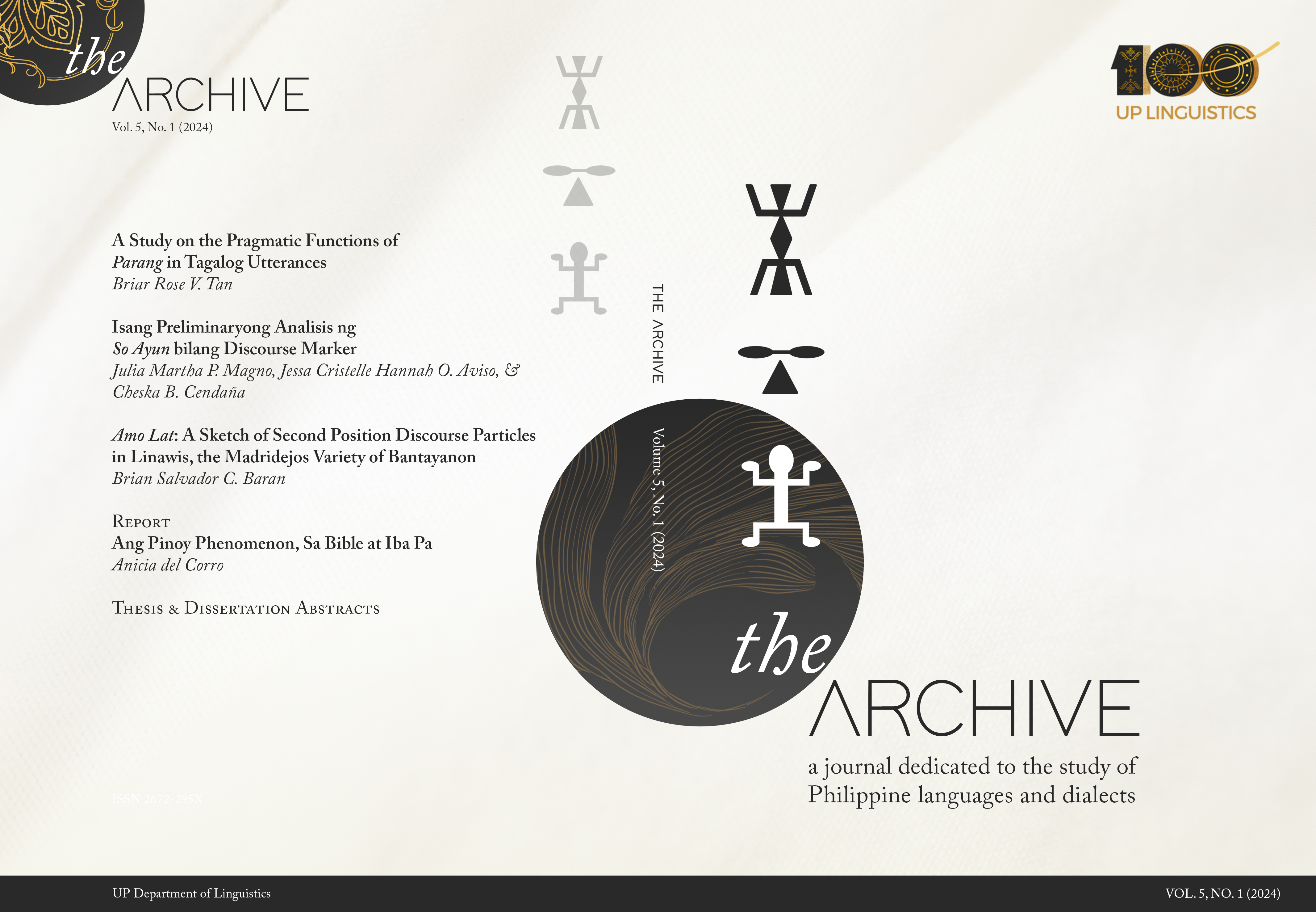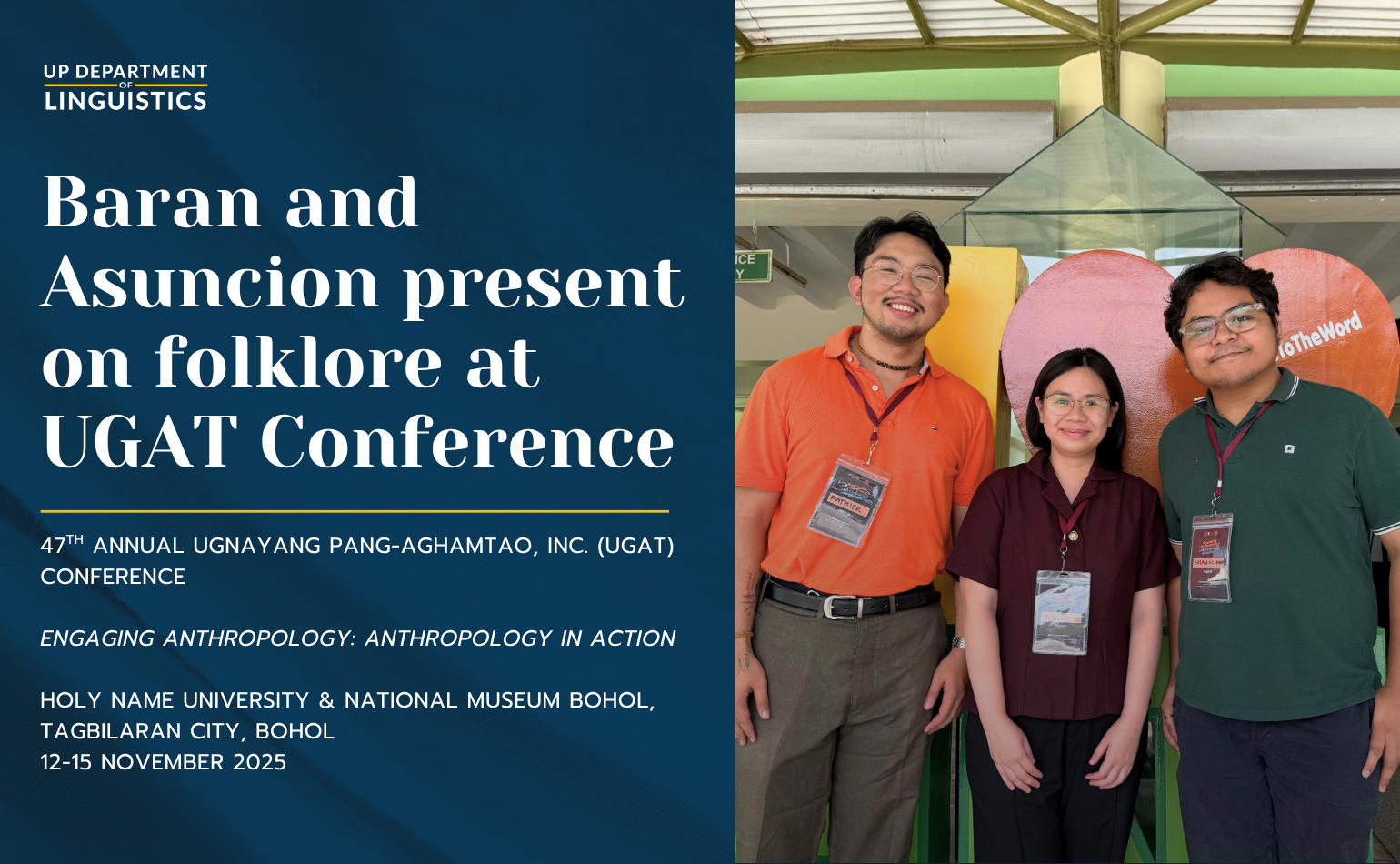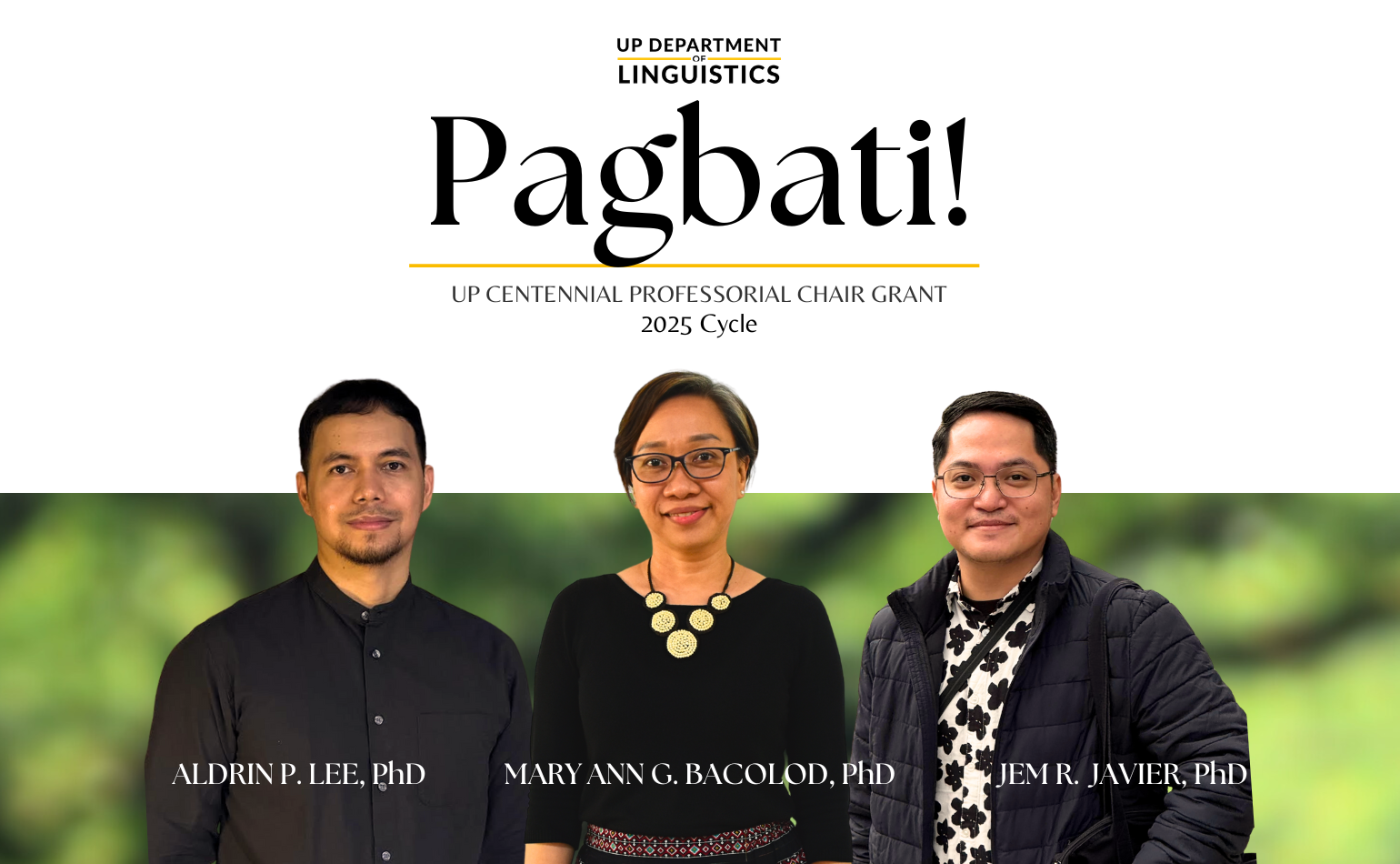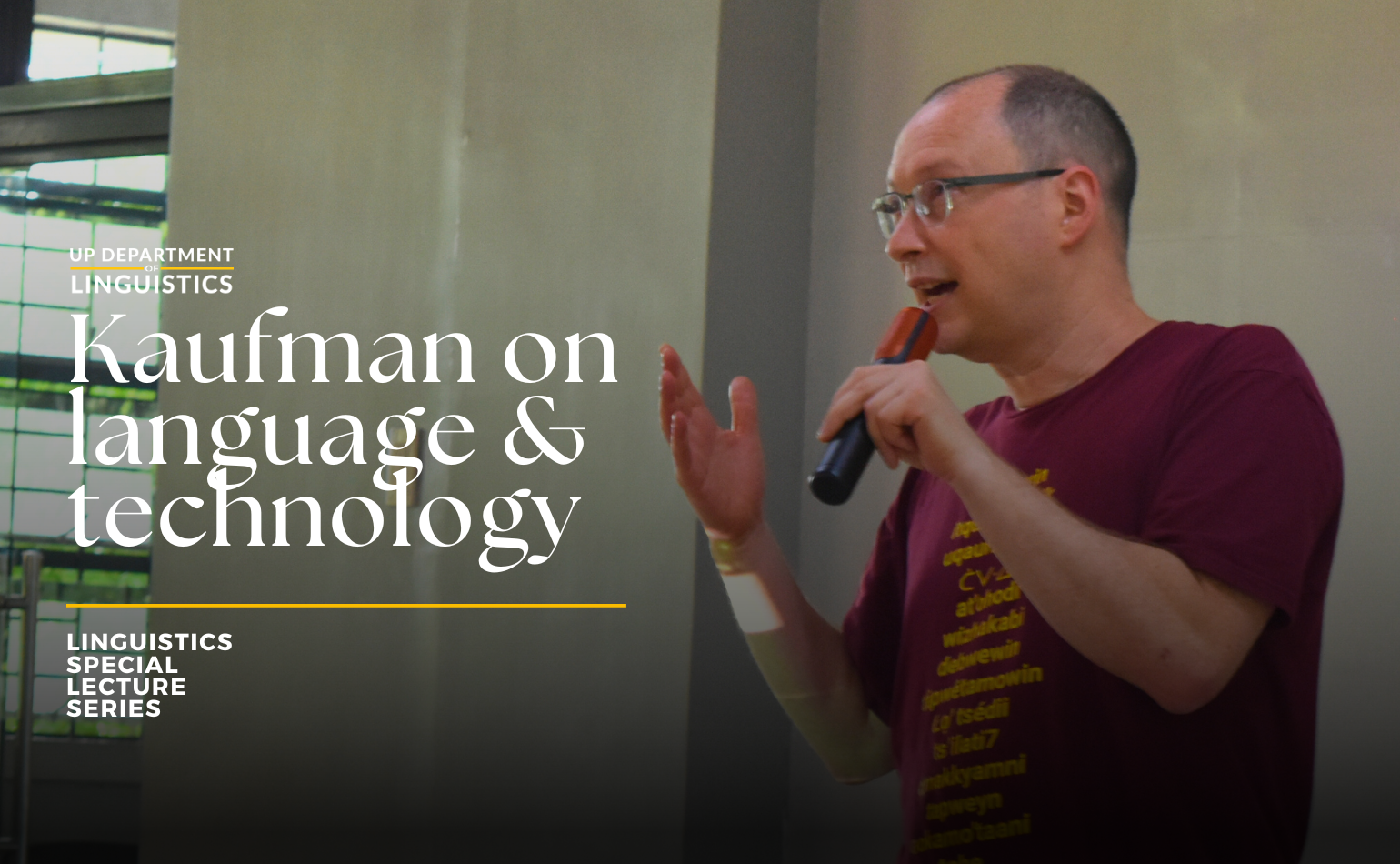
The Archive, the official publication of the UP Department of Linguistics, has released its fifth regular volume. It is the first of two issues on papers presented at the Philippine Linguistics Congress. The issue features three articles on discourse particles, a report on the use of Pinoy English, and the abstracts of theses from graduates of the Master of Arts program of the Department.
This issue was helmed by Assoc. Prof. Jem R. Javier (editor-in-chief), Assoc. Prof. Maria S. Kristina Gallego (issue editor), Asst. Prof. Divine Angeli P. Endriga (managing editor), James Dominic R. Manrique (editorial assistant, layout, and cover design), and Victoria N. Vidal (administrative assistant). The latest issue can be accessed via this link.
Centennial Celebration with Landmark 15th Philippine Linguistics Congress
August 2023 marked a historic milestone for the Department of Linguistics as it celebrated 100 years since its establishment. The centennial festivities culminated in the highly anticipated 15th Philippine Linguistics Congress (15PLC), a three-day event that showcased groundbreaking research and set a forward-looking agenda for the future of Philippine linguistics.
Founded on August 28, 1922, the Department of Linguistics has steadfastly pursued its mission to be the center of research on Philippine languages and to contribute to the development of the national language. A century later, the Department remains a hub of linguistic scholarship, archiving, and innovation. The 15PLC reflected this legacy, bringing together a dynamic mix of established scholars, emerging researchers, and students to explore diverse topics in linguistics.
A Showcase of Research Excellence
The 15PLC plenary sessions highlighted key areas of the Department’s work, including language documentation, historical linguistics, Filipino as a national language, and language teaching. The faculty members led discussions on these themes, reflecting both the depth of expertise and the evolving challenges in the field.
The Congress also featured papers from a variety of sub-fields, such as sociolinguistics, ethnolinguistics, and applied linguistics, as well as experimental and theoretical linguistics. Poster sessions and student presentations underscored the event’s commitment to fostering young talent, with junior scholars sharing fresh perspectives and innovative methodologies.
The 15PLC Book of Abstracts is available in this link. Moreover, the book of abstracts of all Philippine Linguistics Congress conducted are accessible in the PLC Digital Repository.
Spotlight on Presented Papers
Highlighted in this volume are studies on discourse particles, showcasing how subtle linguistic elements shape communication.
First is Briar Rose Tan’s “A Study on Pragmatic Variations of Parang in Tagalog Utterances” which examined the functions of the particle parang beyond its usual usage in constructions of similitude. She utilized deliberately constructed questions to elicit naturalistic speech from language consultants from various age groups.
The second article is Julia Martha Magno, Jessa Cristelle Hannah Aviso, and Cheska Cendana’s “So Ayun as a Discourse Marker” which explored the grammaticalization of this emerging English-Tagalog expression through naturalistic data from social media.
The third article is Brian Salvador Baran’s “Amo Lat: A Sketch of some Second-Position Discourse Particles in Linawis” which detailed 34 Bantayanon particles collected from conversational and narrative data. The paper identified the functions and distributions of the particles and it also revealed the interplay between language borrowing and multilingualism in Central Visayas.
The discourse particles examined in these papers emphasize how language operates beyond mere sentence construction, facilitating nuanced and cooperative communication. The papers also emphasized the need to go beyond elicited data by utilizing methods that produce naturalistic data.
Additionally, the issue includes Anicia del Corro’s report, “Ang Pinoy Phenomenon, sa Bible at iba pa,” which builds on her plenary presentation at the 13th Philippine Linguistics Congress in 2018. The Pinoy Phenomenon is a manner of language use characterized by the mixed use of Tagalog and English, prevalent among younger speakers. Her work applied this linguistic trend to Bible translation, aiming to make the scriptures more accessible to a modern audience by reflecting their natural speech patterns.
This volume also features abstracts from the theses of recent Master of Arts in Linguistics graduates: Benito V. Nolasco, Jr.’s “Modality in Ilocano” and Vincent Christopher Santiago’s “A Grammatical Sketch of Porohanon.” The full works are available in the University of the Philippines library.
Looking Ahead to the Next Century
As the Department of Linguistics embarks on its second century, issue editor Maria Kristina Gallego notes that the 15PLC and the corresponding The Archive publication are a “testament to the growth of Philippine linguistics in the past one hundred years.” The 15PLC not only honored a century of linguistic achievements but also laid the groundwork for continued innovation and exploration, reaffirming the Department’s role as a beacon of linguistic excellence in the Philippines and beyond.
The Archive was originally published in the 1920s by Otto Johns Scheerer as a repository for working papers of the Department’s graduate students. It now publishes research outputs in three different categories: the Regular Issue, which is the peer-reviewed publication for original works dealing primarily but not exclusively with Philippine languages and dialects; the Special Publication, which is a venue for publishing single, extensive works on Philippine languages, translations, and other similar works; and the Classics series, which reprints monumental works in Philippine linguistics that paved the way for further research in the field and continue to influence current studies on Philippine languages.
The Archive accepts submissions all year round. It is officially hosted by the UP Diliman Office of the Vice-Chancellor for Research and Development, through the UP Diliman Journals Online website, where previous and current issues of the journal may be freely accessed and downloaded. More information about the journal and submission guidelines are available through this link.
Published by Divine Angeli P. Endriga



